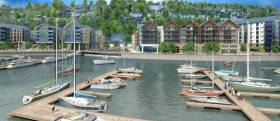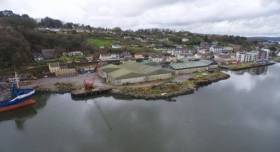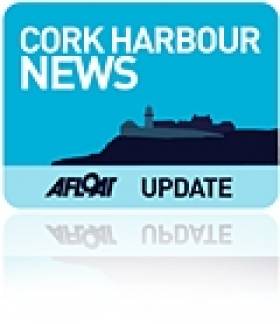Displaying items by tag: Passage West
Tributes to Teen Who Died in Passage West Swimming Tragedy
Tributes have been paid to a 14-year-old boy who died after getting into difficulty while swimming in Passage West on Thursday afternoon (24 August).
According to RTÉ News, Jack O’Sullivan from the nearby area of Deerpark disappeared under the water while swimming with friends off a boat pontoon in the Cork Harbour town.
A multi-agency search operation was launched involving the Irish Coast Guard’s Waterford-based helicopter Rescue 117, Crosshaven Coast Guard unit and RNLI, gardaí, ambulance service, fire brigade and Naval Service.
His body was recovered from the water by divers from Mallow Search and Rescue shortly after 4pm.
Principal Aaron Wolfe of Jack’s school Coláiste Éamann Rís said: “Jack was a charming, charismatic young man, with a beaming smile, who represented the school in all sporting areas.”
RTÉ News has more on the story HERE.
Cork Harbour: Upset As Passage West Docks Won’t Be Sold
#waterfrontproperty - People in Passage West, reports EchoLive.ie, have reacted with bitter disappointment to the announcement that the local dockyards are no longer to be sold to Cork County Council.
The Evening Echo revealed yesterday that the docks - the location for a major town centre regeneration proposal - has been taken off the market because of uncertainties surrounding Brexit.
The council had been granted €1.9m from the Government last November to buy the docks from the Doyle Shipping Group for a regeneration scheme that would see the docks become a modern waterfront settlement overlooking the harbour.
However, Brexit has led to the decision to take the site off the market, because it does not know what Ireland's future shipping needs will be.
Local Councillor Michael Frick Murphy said there is a lot of disappointment in the area and people feel the potential of Passage West is being thrown to the wayside.
For comments made by the councillor and more, click here.
Cork Harbour: Passage West Docks Sale Scuppered by Brexit
#waterfrontproperty - Plans in Cork Harbour, reports EchoLive.ie, to redevelop the dockyard in Passage West have been scuppered by Brexit.
The planned redevelopment of the dockyard site into a modern, urban waterfront settlement had been hailed as a ‘game-changer’ for the town when funding was secured to purchase the dockyard from the Doyle Shipping Group last November.
Cork County Council was granted €1.9m by the Government to purchase the eight-acre site but in a ‘bombshell’ announcement yesterday, County Hall chiefs said the site has been taken off the market and the funding would likely be lost.
Senior Executive Officer in County Hall, Jim Molloy, said the dockyard was no longer for sale because the uncertainty that Brexit has created for Ireland’s future shipping needs.
The announcement was described as a bitter blow for Passage West but Mr Molloy said a ‘wait and see’ approach is being adopted by shipping companies and ports until the implications of Brexit are known.
For more on the story click here.
Cork Harbour Site On Market For Fraction Of 2016 Price
#CorkHarbour - Falling prices across prime Cork Harbour waterfront sites could be a boon for investors with serious plans in light of the Government's new marine focus.
As the Irish Examiner reports, the former Haulbowline Industries site at Passage West, which went for €25 million less than a decade ago, is now on the market for a fraction of that price.
It's expected that it will play a role alongside the busy Port of Cork, as will the 114-acre site at Marino Point directly across the harbour pinch point, for which a deal is being done for a similarly significant discount on its previous price tag.
Though previous ambitions for the Passage West site as a flagship €200-million marina development did not come to fruition, it remains centre of a thriving working port.
And with sales on smaller cites in Cork city proper reaching the eight-figure mark, it's the best time in years for marine-minded investments aiming to take advantage of Ireland's burgeoning 'Blue Economy'.
The Irish Examiner has more on the story HERE.
Hundreds Gathered for Cork Harbour Open Day
Cork Harbour Open Day proved to be a great success with hundreds of people enjoying the harbour and the free family events on offer. Throughout the day, the LE Aoife at Horgan's Quay welcomed families and children on board where they were given a tour of the ship and an insight into Navy life. The sailing race from Cobh to Blackrock, sponsored by the Port of Cork, was a huge success with over 50 boats taking part. Blackrock Castle opened the tower to the public and was busy throughout the day with people using the tower to watch the boats sail through the finish line at Blackrock.
Camden Fort in Crosshaven attracted hundreds of visitors to see the newly restored rooms and to learn more about the 'Rescue Camden' project. Also in Crosshaven the Coastal Rowing Association organised their end of season championship regatta where Passage West won all eleven races and the RNLI Station opened to the public.
'Dreamer' the fastest rigid inflatable boat (RIB) round Ireland was at the Port of Cork Marina for all to see. Built locally by Gale Force Ventures in Carrigaline and owned by current round Ireland record holder, Phillip Fitzgibbon from Co. Kerry, the 10 metre RIB can reach a speed of 65 knots.
Further events such as the World Rescue Challenge on North Custom House Quay, attracted large crowds over the whole weekend and in Cobh, the 'See You in Cobh' committee organised a crab fishing event on the promenade with over 80 children taking part.
One of the organisers of Cork Harbour Open day, Sara Dymond was thrilled with the day saying: 'The sun shone in Cork Harbour on Saturday and showed the harbour in all its glory. Cork Harbour Open Day aims to raise awareness of the different activities available for people in the harbour both on and off the water and this year we saw an exceptional turnout of people of all ages. There are endless activities to do in the Harbour and this year proved how popular the harbour is and how much people enjoy it. We hope to expand on this for next year.'
She continued: 'Thank you to all those who arranged events and helped out on the day.'
The idea for a Harbour Open Day emerged from discussions between various stakeholders involved in the development and implementation of the Integrated Strategy for the Harbour. A group comprising representatives from UCC, City and County Councils and the Port of Cork set about working together to engage users of the Harbour and to organise the Open Day.
Images from Bob Bateman on the Afloat Gallery HERE
































































